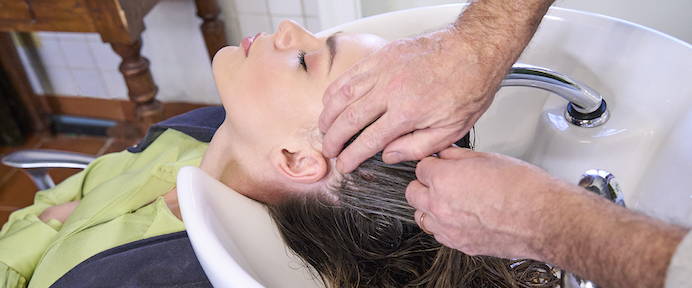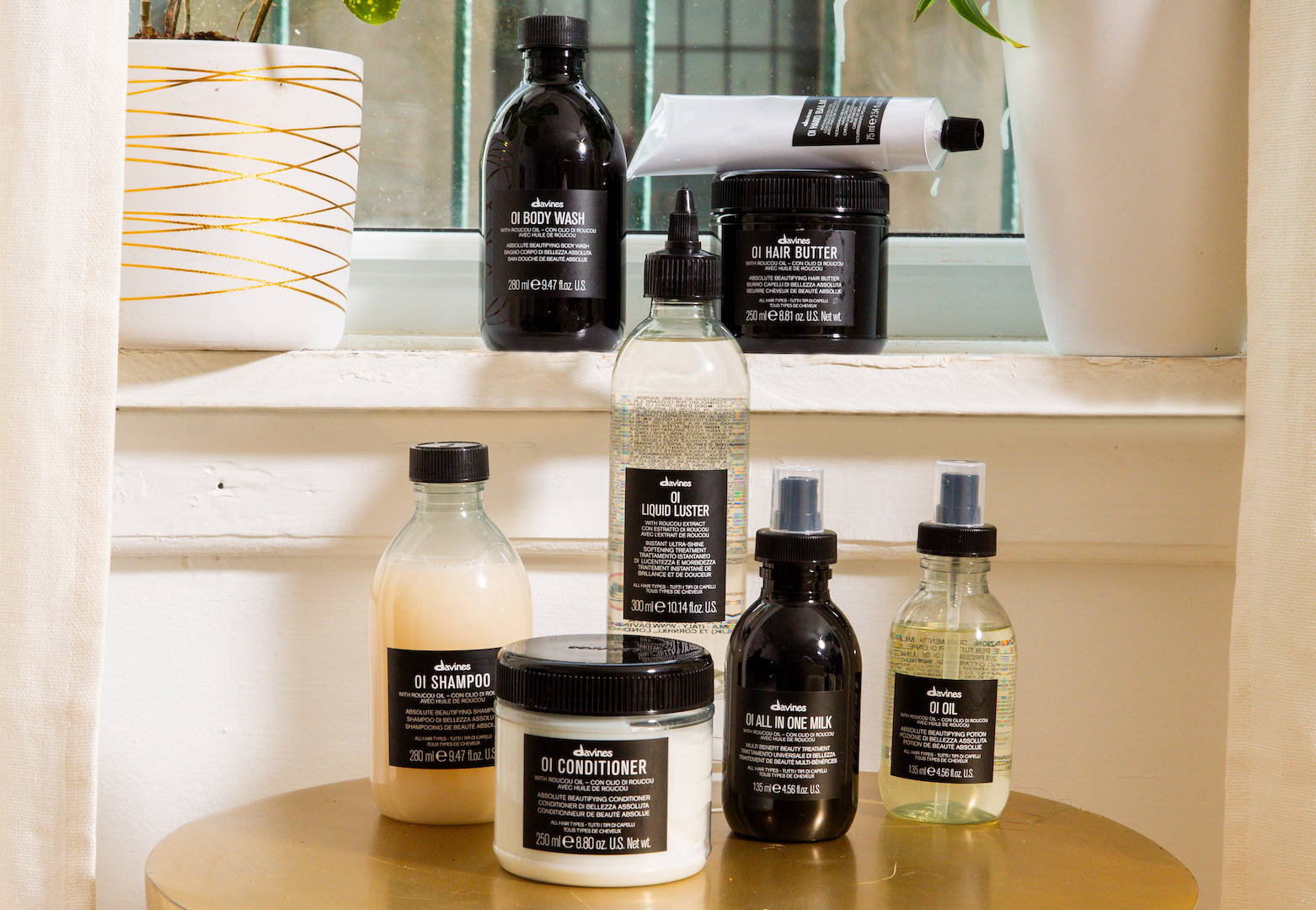Pay with Klarna
Free Carbon Neutral Shipping On Orders $75+, Plus Free Samples!
It’s getting cold outside and that means more than just adjusting your wardrobe. The winter months can wreak havoc on your hair: the season’s cold weather, indoor heating, and hot showers all put stress on your strands leading to dryness, dandruff, and breakage. That’s why it’s important to step up your winter hair care routine once the temperature drops.From static frizz to split ends, we’re breaking down the best hair tips and product picks to handle your winter hair woes. Read ahead for our guide to protecting your hair from the cold this winter.
The winter weather can put a damper on your hair health. The change of temperature from warm to cold causes issues like dry hair, dandruff and flakiness. This can lead to hair that’s dull and lifeless, even brittle and prone to breakage. On the other hand, when it snows or rains the moisture causes your hair texture to change, leading to unruly frizz and static hair. These common winter hair problems are then exacerbated by factors like dry air and hot showers, and indoor heating. These effects of the cold weather can be particularly harsh on certain hair types. So it’s important to tailor your care routine accordingly. Knowing your hair type is a must when addressing your winter hair concerns, and different hair types react differently to harsh winter conditions. Read ahead for our top winter hair care tips for keeping your hair looking healthy through the season.
Winter is one of the most damaging times for your hair. The cold outside and artificial heat inside make dryness inevitable, leading to a loss of shine and volume and leaving you with limp, brittle strands. But by washing your hair the right way, you can prevent this before it starts. Follow these cleansing tips for making the most out of winter hair.

You should avoid sulfates all the time, but especially during the dry months of winter. Sulfates strip your hair of its much-needed moisture, leading to fragile strands that are prone to damage. Using a sulfate-free shampoo prevents excessive dryness and build-up, and helps maintain the natural oils on your scalp and hair, leaving it with more moisture.
A hot shower can feel amazing when it’s cold out, but using hot water on your strands is just plain bad for them. Hot water lifts the hair's cuticle, causing moisture loss, dehydration and color fade. Hot showers can also leave your scalp dry and itchy. The key to healthier hair this season is using lukewarm water when you wash.
Be gentle when washing your winter hair. Gently massage your scalp in small circles, using your fingertips to loosen any dirt, skin flakes, oils, and residue. And be just as gentle with your hair when you sleep, using a silk or satin pillowcase to reduce friction.
Doing a cold rinse at the end of your shower can do wonders for your hair. Cold water rinses leave your hair stronger and healthier by closing hair cuticles and reducing frizz. It’s ok to use warmer water during the cleansing phase, but rinsing with colder water is ideal.
No winter hair care guide would be complete without mentioning the benefits of conditioning during the colder months. Conditioning helps stimulate and promote blood circulation to the scalp, helping with hair growth and creating shine. It also replenishes and rejuvenates winter-damaged hair, and helps to restore moisture and manageability, especially on windy days. Stock up on these conditioning and hydrating treatments for your hair.
There’s nothing like a hydrating conditioner for transforming dry hair into healthy hair. Hydrating conditioners combat dryness, leaving you with smoother, softer, healthier hair that’s less prone to breakage. A moisturizing conditioner for dry hair will help untangle your strands, leaving them soft, silky and strong.

Leave-in conditioners are a game changer for retaining moisture and a must in your winter hair care routine for Leave-in conditioners provide extra hydration to your hair as well as protect it from heat, the environment, and breakage — all while detangling.
Using deep conditioning treatments, like hair masks is maybe the single most important winter hair hack this season. A smoothing hair mask gives your hair softness and immediate anti frizz action. It helps to reduce unwanted volume and tame dry winter hair for sleek and smooth results.
Another must-have hydrating product in your hair care in winter should be heat protectants. You should try to avoid using heat on your hair when it’s cold out, as it leads to more dryness. When that’s not an option, be sure to prep your strands. Heat protectants coat your strands before they’re exposed to minimize moisture-loss when blow drying or styling with heat tools.
If your scalp feels tight or itchy, you’re likely dealing with a dry scalp. Your hair may look dry and dull, and may even fall out. You can combat dandruff and scalp dryness by incorporating regular trims and using products for dandruff with salicylic acid or zinc. Keep a humidifier by your bed while you sleep to help you maintain the right indoor humidity level. Finally, switching to a silicone-free hair care routine will help you avoid product build-up and flakes on the scalp.
Quench your winter hair’s thirst by using natural oils in your routine for deep hydration and nourishment. Natural oils work to improve the health of your hair and scalp. Grapeseed oil and argan oil are antioxidants that can help protect against UV damage, while jojoba oil can help promote hair growth. If you’re looking to target split ends or damage, coconut oil and olive oil are effective. Incorporate these oils in your hair care routine as a pre-shampoo treatment.
A variety of factors contribute to healthy hair growth. While genetics significantly influence, other factors such as your nutrition, environment, and seasonal shifts affect hair growth. Hair grows more slowly in the winter. The primary cause of this is a lack of moisture, so in winter especially, you must keep your strands hydrated to support your long-term hair health. These tips will help you combat winter hair issues and promote hair growth.
Sadly, there is no cure for split ends, but there are prevention and treatment options. In the end, however, the only way to eliminate split ends entirely is to get your hair cut or trimmed. By trimming your hair, you’re able to prevent your hair from splitting further up the strand and avoiding further damage.
By adopting a thoughtful and proactive approach to hair care, you can not only manage existing split ends but also minimize their occurrence in the future. Here are a few tried-and-true ways to maintain the vitality and beauty of your hair.
More common in the colder months, hair loss can be a huge problem. But during the winter especially, hair loss is most often a result of using too much product or even constantly wearing hats. So it’s important to maintain healthy hair follicles to promote growth and prevent hair loss this season.

All hair textures lose their luster in the winter because of dry air and low humidity. This causes the cuticle to become rough, while the outer layer of the hair sucks up all the moisture it can, causing frizz and leading to breakage. Minimize this by using hydrating hair products to encourage your hair’s natural hair growth.
The cold winter weather can have lasting negative effects on your hair that lead to hair loss if not managed properly. Combat the cold, dry air, and high winds of the season by incorporating hair treatments like a weekly scalp scrub into your routine. This helps create an optimal environment for hair growth, while fortifying cuticles and maintaining proper moisture levels.
A balanced diet can help you avoid winter hair loss and help promote new growth. Your diet should consist of essential fatty acids, especially omega-3s. Protein and Vitamins B6, B12, and folic acid are also important to your hair. Vegetarians and vegans often don't get enough of these nutrients.
It’s also important to add deep conditioning treatments and hair masks into your routine once a week. These intensive treatments provide your hair with extra hydration, nourishment and repair.
Certain kinds of hair loss should be assessed by a dermatologist. There’s a big difference between a few strands of hair that fall out each day and more hair being lost than hairs growing in. If you’re experiencing the latter, a dermatologist will need to be consulted.
Follow a consistent and customized winter hair care routine to maintain your healthy hair this season. Follow our tips for hair care in winter and use only the highest hair products like the ones from Davines. All our formulas are free of harmful toxins, use many natural ingredients, and are made with renewable energy and packaging that minimizes the environmental impact. Our hair care isn’t just good for your hair, it’s good for the planet.
by Jaclyn LaBadia, featured contributor
Leave a comment
Comments will be approved before showing up.